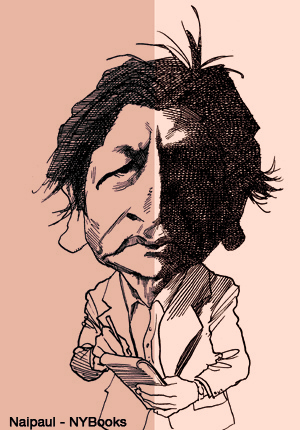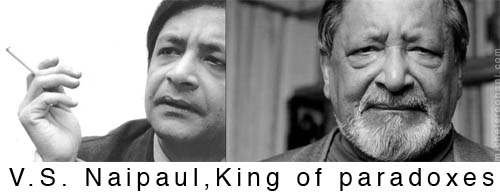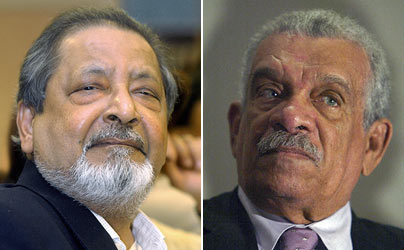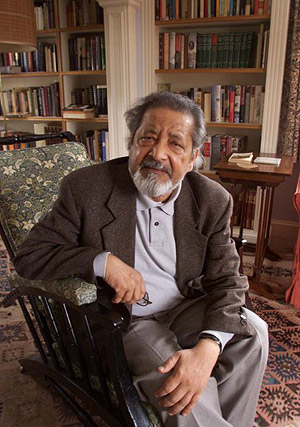I’ve been reading this extremely entertaining book about V.S. Naipaul—The world is what it is—and realizing more and more how his anger towards banality, mediocrity and simple pettiness of people makes sense (of course he is obviously not a nice man). I have written about him before and my interest in him was sharpened after I read in the BBC about this biography of his being published without him changing a word of it. Now, that’s courage…
A good article about the book and the five years it took Patrick French to write it was published in The Nation ; a fascinating glimpse of the mind of the “supreme egotist”.
I find Naipaul’s banter with Derek Walcott amusing; read about it in The Telegraph.
Two Nobel Laureates from the West Indies fighting like children—cute!
Ian Buruma describes him well: “Naipaul’s voice, which some younger writers are tempted to mimic, cannot be defined by citing his opinions on race, the colonial experience, India, literature, or anything else. His views are frequently designed to shock and outrage.”
Cynicism (at its best) jumps at you from every page of French’s book and Sir Vidia’s lucid prose has kept me awake all last week. I empathize when he says: “my life is too short, I can’t listen to banality”.
Like Naipaul, I have refused to engage in wishful thinking all my life and if this makes me a cynic, be it! “The world is what it is; men who are nothing, who allow themselves to become nothing, have no place in it.”
added on 12/23/08—I keep looking for him—just read James Wood’s article, Wonder and Wounded: He is socially successful but deliberately friendless, an empire of one: “At school I had only admirers; I had no friends.”
added on 12/27/08—”Artists cannot claim immunity from decency.” Yasmin Alibhai-Brown
I agree to a certain point with her but I don’t believe that artists should be judged by their personality (ies)—Picasso must have been an impossible man with his lovers but I can’t deny his art…
Is Naipaul “mad, bad and dangerous to know” like Lord Byron was? Read this very good article in Times by Magnus Linklater.





Truly, a Devil, who has had no or little consequence on anyone or anything, and the man speaks of banality.
A befiting statement by Derek Walcott in his poem “A mongoose charges dry grass and fades through a fence faster than an afterthought”
dear nimesh,
have you read any of naipaul’s work?
he’s not been kind to anybody especially not to himself—he’s been brutal to my country, Iran, but i think we have to look at his work beyond his usual B.S…
this is a man who’s betrayed his wife, his mistress, his friends and his countries (all three of them!) but i have to admire his ruthless prose, his brilliant alertness and his unbelievable intelligence; i sure don’t want to have dinner with the man…
his punishment is to live until his last days with Nadira!
VS Naipaul croit à l’arbitraire et au chaos…Est-il possible de lui donner tort?
“La vie est un conte, plein de bruit et de fureur, raconté par un idiot et qui ne signifie rien” Shakespeare Vous me pardonnerez de faire cette citation en français mais je crois que la traduction est correcte.
I have read , India, An Area of Darkness where it referred to India as “Turd World” … I cannot comment any more.
His works are not criticisms rather a disdained view to India. Perhaps more catered to Europeans who see India through the Eyes of CNN and BBC or New Channels, who portray India or any other Third World Country with Images of Poverty and Squalor.
I woudl certainly like to read his Biography.
I m not really qualified to give opinion, but my “ off the cuff” response is that he is not much relevant or being talked about in India,as much as in west.
I did read his Book – India: A Wounded Civilization,which truthfully, I had found it infuriating & hypercritical. It was full of personal prejudices & chauvinism. In fact I was bitter when he was awarded Nobel
As a “grownup”, I find him concerned with matters of consequence. There seems to be no time for idle dreaming. Time is short, people & countries who have left their mark on him become his subjects &, betrayal of them, a matter of consequence. He lost the “kid” in him long time ago….a high price for a wounded, alert & knowlegable man who has had his share of challenges. In return he speaks his mind, his truth, moves on, and makes no appologizes! “Truth is more important than the image”. A welcoming departure from being concerned about winning any popularity contest or being politicaly correct.
I should think his novels might last though in these technological times, his kind of Dickensian darkness might be better rendered in the visual arts. Naipaul’s novels are wonderfully regressive which is why he has no use for the modernists. There is something condescending about the praise of his clear, honest prose which I think is praise actually for what he says about his subjects! The really silly explanation by the reviewer in The New York Review of Books confirms Said’s assessement that for the lazy West, his travel books on the third world will do. I can’t get through them again and it amazes me that these people talk about his unsparing objectivity or his unsentimentality! The beautiful, subjective, driven prejudices are so obvious in his works. It’s not objectivity here that creates these books, but a pre-ordained hatred! Did he expect people and cultures, coming out of a colonial world, what, less than two decades, would please him! And it’s simply not true that he was the first to “expose” third world countries. The great American writer, Richard Wright, wrote a disturbing and splendid book on Ghana in 1954 that was hardly flattering to Africa, but was free of the “high-minded” sneer of Naipual’s fussy missles. Wright’s Black Power was essay fiction full of criticism and humanity. He was the pioneer! It’s ironic how in the past when black writers around the world wrote in anger and rage via a via the West, the art was considered problematic. But now Naipul’s rage and hatred is elevated simultaneiously as an exemplary art!
A House for Mr. Biswas and Miguel Street are, to my way of viewing things, masterpieces. Yes, he is, like life, hard, but a humanist nevertheless.